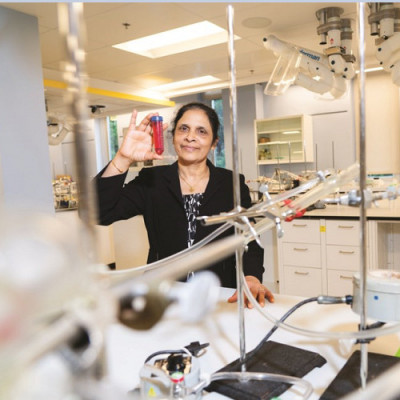
2023-04-14
Visited : 1130
UVic research on gold nanoparticles could make cancer treatments more effective—and easier on patients
Intravenous (IV) chemotherapy cancer treatments come with a host of unpleasant side effects.
Cancer-fighting drugs are delivered via the bloodstream, impacting systems throughout the entire body, with only 0.1 per cent reaching cancer cells. Even a targeted treatment like X-ray therapy is often paired with IV chemotherapy, which increases side effects.
University of Victoria medical physicist professor Devika Chithrani aims to change this. After completing her PhD in quantum physics, Chithrani took a risk, switching to post-doctoral research in biomedical nanotechnology. She investigated a then-new technique: inserting gold nanoparticles (GNPs) into cells to enhance X-ray therapy. When X-rays collide with gold atoms additional electrons are released, increasing the damage to GNP-containing cancer cells. Chithrani narrowed in on the optimal gold nanoparticle size for cellular uptake, and published it in her 2006 paper, which has been referenced by other health researchers over 5,300 times—and counting.
To say Chithrani enjoys her work is an understatement. “It doesn’t feel like work— this is like my hobby!”
Chithrani’s group recently found extremely promising results using the chemotherapy drug docetaxel that sensitizes cancerous cells to radiation. Chithrani and her industry partner, Chris Tam of Integrated Nanotherapeutics, collaborated to target delivery by placing docetaxel in submicroscopic fat balls called lipid nanoparticles (LNPs). Unlike normal blood vessels, fast-growing tumors are leaky. So, tumors preferentially absorb and retain LNPs.
Chithrani also discovered that docetaxel pulls GNPs towards cancer cell nuclei—right where it can best enhance radiation treatments.
Next, Chithrani plans to encapsulate both docetaxel and GNPs within LNPs. The Nanomedicines Innovation Network awarded Chithrani two grants, funded by Networks of Centres of Excellence (NCE) program, to improve delivery, targeting, and activation of chemotherapeutic drugs while decreasing side effects. Chithrani was awarded $200,000 to research a nanomedical approach to pancreatic-cancer radiation therapy.
A second grant, to use radiation to trigger the release of LNP payloads only at tumor sites for head and neck carcinomas, is a collaboration with UBC molecular biologist Pieter Cullis—known for encapsulating m-RNA in LNPs for COVID-19 vaccines.
Chithrani’s work is highly collaborative, and she chooses to avoid competitive aspects. “I collaborate with many institutes: BC Cancer (Vancouver and Victoria), Mayo Clinic (Florida), Maryland School of Medicine (Washington), McGovern Medical School (Texas). It’s not about who’s going to win here. It’s about how/what can we do here.”
While precious-metal therapy may sound pricey, Chithrani notes that even a gold standard treatment must be cost effective. “What will be the expense per patient? This is important—we want to build something, but we must keep the healthcare system cost low. We estimate a complete six-week treatment would require less than $200 in gold.”
Chithrani is also interested in the environmental impact of cancer therapies. The efficiency and effectiveness of treatments arising from her research could reduce the amount of time people require medical interventions. “I really believe this kind of treatment can be more environmentally friendly.”
And Chithrani isn’t focussed solely on her impressive research program. She insists on teaching first- and second-year physics classes, where she can reach more students and have the most impact inspiring the next generation of scientists.
Chithrani developed an introduction to biomedical physics course at UVic and was recently nominated for the UVic Faculty of Science Teaching Excellence Award. “I want to encourage those early students — really get them thinking critically! If you want to be recognized, you must achieve something. So, I ask them ‘What is your next level? How can you move yourself up?’”
Read the original article on Times Colonist.